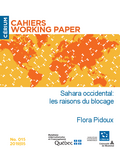Flora Pidoux est candidate au doctorat en science politique à l’Université de Montréal.
Résumé
Le Sahara occidental est en proie à un conflit qui perdure depuis le départ du colon espagnol en 1975. Il oppose les forces marocaines, qui contrôlent 85% du territoire et souhaitent y assoir leur souveraineté, au Front Polisario, forces sahraouies qui réclament leur droit à l’autodétermination. L’Organisation des Nations unies (ONU) est impliquée dans le processus de résolution du conflit depuis la fin des années 1980, en vain. Cet article vise à expliquer comment, malgré la bonne volonté apparente de l’ONU, des membres du Conseil de sécurité bloquent délibérément la réussite des efforts. L’échec, et par conséquent le maintien du statu quo, offre en effet un avantage comparatif incontestable par rapport aux solutions alternatives. Après un retour sur l’histoire du conflit et une présentation des parties prenantes et intéressées du conflit, cette recherche montrera pourquoi les options du référendum, de l’imposition d’une solution, et du retrait de l’ONU du contentieux ont toutes été écartées au profit de la continuation de négociations.
Abstract
Western Sahara has been the object of a conflict since the departure of the Spanish settler in 1975. The conflict opposes Moroccan forces — who control 85% of the territory and wish to assert their sovereignty — to the Polisario Front, the Saharawi forces claiming their right to self-determination. The United Nations (UN) has been involved in the peace process since the late 1980s, to no avail. This paper aims to explain how, despite the efforts of the UN, several members of the Security Council are deliberately blocking all solutions. Failure, and therefore the perpetuation of the status quo, indeed offers an undeniable comparative advantage over alternative solutions. After reviewing the history of the conflict and presenting the stakeholders involved in the conflict, this paper will show why the referendum, the imposition of a solution, and the withdrawal of the UN from the dispute are solutions that have all been dismissed in favour of the continuation of futile negotiations.


